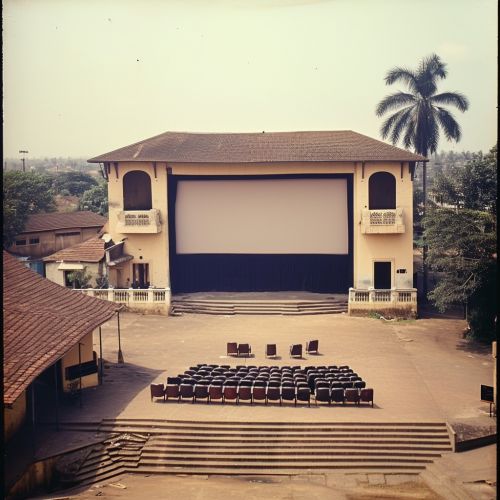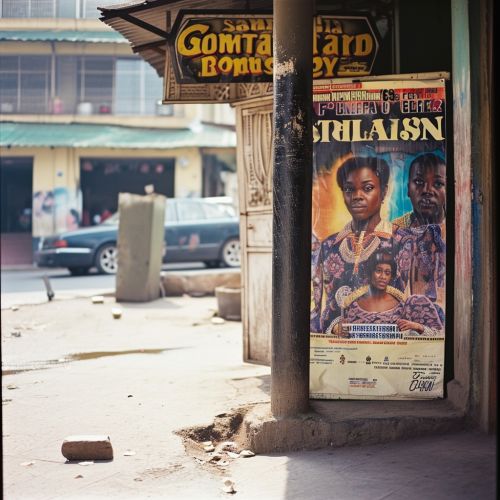Cinema of Nigeria
History
The Nigerian film industry, also known as Nollywood, has a history that dates back to as early as the late 19th century and into the colonial era in the early 20th century. The history of cinema in Nigeria can be divided into several phases: the Colonial era, the Golden Age, the Video film era, and the emerging New Nigerian cinema.


Colonial era
The Colonial era was the period of British colonial rule in Nigeria from 1914 to 1960. During this time, the cinema was a major medium of communication and a significant tool for British propaganda. The first film exhibited in Nigeria was in August 1903 at the Glover Memorial Hall, Lagos. The film shown was a recording of the coronation of King Edward VII. During this period, mobile cinema vans were used to show educational films to the Nigerian public, most of which were produced by the Colonial Film Unit.
Golden Age
The Golden Age of Nigerian cinema is considered to have occurred in the late 1950s to the late 1980s. During this period, Nigerian films were made using celluloid. This era was marked by several historical and culturally significant films, many of which were influenced by the socio-political climate of the time.
Video film era
The Video film era, also known as the home video era, started in the late 1980s and continues to dominate the Nigerian film industry today. This era was marked by the dominance of direct-to-video films, which were cheaper to produce and more accessible to the Nigerian public. The era was kick-started by the commercial success of the Yoruba theatrical film Living In Bondage in 1992.
New Nigerian cinema
The New Nigerian cinema is an emerging phase in Nigerian cinema, in which there is a shift towards quality over quantity, with filmmakers paying more attention to the aesthetics of film production and focusing on thematic depth. This new wave of cinema has been influenced by the availability of digital filming and editing tools, as well as increased access to global film markets.
Industry
The Nigerian film industry is currently the second largest film industry in the world in terms of output, producing about 2,500 films annually. It is also the second largest employer in Nigeria. The industry has a significant impact on the Nigerian economy and culture, contributing about 1.4% to Nigeria's Gross Domestic Product (GDP).


Production
Film production in Nigeria is largely informal, with most filmmakers operating independently and financing their films through personal funds, investor contributions, and sponsorship deals. The production process typically involves scriptwriting, casting, shooting, post-production, and distribution.
Distribution
Film distribution in Nigeria is primarily done through the home video market, with films being released on DVD and VCD. However, with the advent of digital technology, there has been a shift towards online streaming platforms, which provide a wider reach and a more efficient distribution process.
Challenges
Despite its success, the Nigerian film industry faces several challenges, including piracy, inadequate funding, lack of standardization, and poor infrastructure. These challenges have hindered the growth and development of the industry.
Impact and Influence
The Nigerian film industry has had a significant impact on the culture and economy of Nigeria, as well as on the global perception of Africa. Nollywood films are popular across Africa and among African diaspora communities around the world. They provide a unique perspective on African culture and have helped to challenge stereotypes about Africa.


Cultural Impact
Nollywood films often depict Nigerian culture, traditions, and societal issues, providing a platform for cultural expression and dialogue. They have played a significant role in shaping the social and cultural landscape of Nigeria.
Economic Impact
The Nigerian film industry contributes significantly to the Nigerian economy, generating employment and contributing to GDP. The industry also attracts foreign investment and promotes tourism.
Global Influence
Nollywood has gained international recognition and has influenced filmmakers around the world. Its unique storytelling style and cultural narratives have been adopted by other film industries, contributing to the global film culture.
